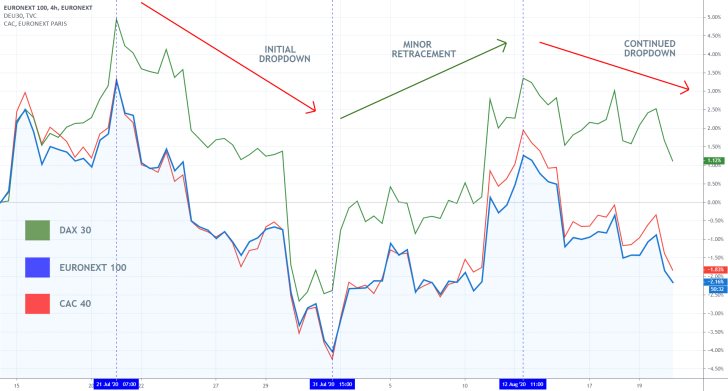
Earlier today, the ECB published its monetary policy minutes from its last meeting, which took place from the 15th to the 16th of July. The comprehensive document began with a review of the latest financial, economic, and monetary developments and policy options for the Governing Council of the Bank.
Since the Council's previous meeting in early-July, it has been evaluated that:
"In both advanced and emerging market economies, financial conditions were approaching pre-pandemic levels at a slowing but steady pace, as also reflected in the strong recovery in global stock markets."
Unsurprisingly, the Governing Council continues to observe a direct correlation between the number of COVID-19 cases in Europe and the momentary condition of investors' sentiment in the Eurozone, which is completely inlined with our own estimations from earlier today.
Positive signs of global economic recovery were also reviewed and were attributed to the gradual easing of containment restrictions. Moreover, the Council acknowledged the role that the rising oil prices are having in fostering better price stability worldwide.
" Since the Governing Council’s June monetary policy meeting, oil prices had increased by around 11%, to just over USD 42 per barrel, supported by a stronger than expected pick-up in demand for oil on the back of the easing of lockdown measures."
Overall, the Minutes report did not deliver any major surprises as the European Central Bank maintains its overarching course. The report highlighted a pick-up in Eurozone's economic activity in Q2.
" […] after a steep fall in the first weeks of the second quarter, the incoming data signalled an increase in the level of euro area economic activity, which was broadly in line with the baseline scenario of the June Eurosystem staff projections. However, the breadth and scale of the recovery remained uneven and partial."
Due to this 'uneven' and 'partial' recovery, most European indices continue to struggle.
As can be seen on the 4H comparison chart below, the German DAX 30 remains the best-performing stock index in the Eurozone, while the French CAC 40 falls behind the composite Euronext 100.
The latest retracements of the three indices have failed to rise above their previous peaks from the 21st of July. This behaviour is demonstrative of waning bullish sentiment and could signal the development of an even bigger bearish correction in the near term.

Trendsharks Premium
Gold is undergoing a correction, as investors take profits to offset losses from falling stock prices, impacting their margins. However, we anticipate a renewed wave of [...]
The Swiss stock market index is mirroring its global counterparts, such as Germany 40 and US100, experiencing a sharp decline following the announcement of new [...]
We’re analyzing the weekly chart to grasp the broader market trend. Over the past three years, the US30 index has surged by 17,000 points, often resembling a nearly straight [...]
Over the past week, the DAX has experienced a sharp decline, plunging by an astonishing 3,400 points. This downward movement is not isolated, as its international counterparts, such as the UK100 and US100, are also facing significant [...]
EURUSD recently formed a double top at 1.0930, signaling a potential trend reversal, and has since begun a correction. After a 600-pip rally since early March, a pullback at this stage is both expected and healthy. Given these conditions, we are placing a [...]
Since early March, EURJPY has surged nearly 1,000 pips, providing us with several excellent trading opportunities. However, as the rally matures, many early buyers are beginning to take profits, leading to a noticeable slowdown in the uptrend. On Friday, the pair formed a [...]
The AUDJPY currency pair continues to be dominated by bullish momentum, as multiple golden cross patterns reaffirm the strength of the ongoing uptrend. Despite this, we are witnessing a much-needed [...]
The EURAUD currency pair appears to be undergoing a trend reversal, signaling a potential shift in market direction. A notable technical development is the formation of a Death Cross on the chart, a widely recognized bearish indicator that typically suggests a [...]
After securing an impressive 200-pip profit last week, the EURJPY currency pair is now undergoing a southward correction, retracing some of its recent gains. Despite this temporary pullback, the Golden Cross remains intact, reinforcing our view that the overall trend continues to be [...]
The appearance of a Golden Cross in Silver strengthens our analysis that the metal is currently in a strong uptrend, indicating further bullish momentum in the market. This technical pattern, where the short-term moving average crosses above the [...]
This trade presents a considerable level of risk and can be classified as an opportunistic move based on recent price action. The GBPUSD currency pair has experienced a substantial bullish rally, surging by nearly 500 pips in a strong upward movement. However, after this extended period of appreciation, the pair is showing signs of a potential [...]
The anticipated Death Cross on the SMI20 appears to be failing as price finds strong support at the 23% Fibonacci retracement level. After testing this area, the index has shown bullish strength, printing several large green candles, signaling an increase in [...]
A Golden Cross has just appeared on the USDJPY chart, signaling a potential bullish move. This technical pattern occurs when the 20 period moving average crosses above the 60 period moving average, a widely recognized indication of increasing [...]
After 2 months of a down trend, we finally see some indications of price recovery for Oil. The golden cross, a historic buy signal, supports this [...]
For the past month, the German DAX40 has experienced a remarkable 10% surge, reflecting strong bullish momentum. Despite ongoing market volatility and frequent pullbacks, every dip continues to attract fresh buyers, reinforcing the [...]
Oil continues its downward trajectory, despite occasional pullbacks. The overall trend remains bearish, reinforced by multiple Death Cross patterns, a classic sell signal indicating further weakness. Adding to this bearish outlook, the critical [...]
Over the past few days, gold has experienced a sharp decline of more than $100. This downturn can be attributed in part to traders securing profits to manage their margins, which are under strain due to the significant drop in major indices. Currently, gold has fallen below the [...]
The NASDAQ 100 index is showing strong bullish momentum, as evidenced by the formation of a Golden Cross on the chart. This classic buy signal occurs when the short moving average crosses above the long term moving average, suggesting that upward momentum is [...]
The EURAUD currency pair has encountered a significant resistance level, failing to break above the critical 61% Fibonacci retracement level. This suggests that bullish momentum is weakening, reinforcing the case for a potential downward move. Given this technical setup, we favor entering a [...]
The UK100 is experiencing a remarkable rally! Over the past few weeks, the British stock market index has surged nearly 800 points. Each minor dip has attracted more buyers, fueling the bullish momentum. However, since last week, we’ve observed a slight [...]




















